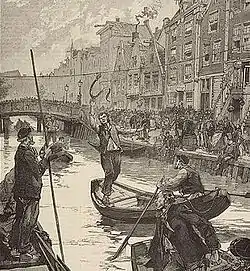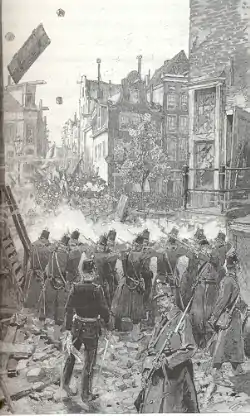Palingoproer
The Palingoproer or the Eel riot was a popular uprising in the Jordaan in Amsterdam on July 25 and July 26, 1886. The riots started when the police tried to thwart playing the forbidden game of eel pulling on the Lindengracht.[1] In the uproar that followed, 26 people were killed. Social historians place the events in a context of social tensions as a result of increasing socio-economic differences in 19th-century Amsterdam society.

Background
Palingtrekken, meaning eel pulling or eel drawing, was an old Amsterdam game. A rope was stretched over a moat from which a live eel hung. The players had to sail underneath in boats and try to grab the slippery eel, with the risk of ending up in the water. Eel pulling was banned by the government as "cruel public entertainment".
On Sunday, July 25, 1886, a game of eel-pulling had started on the Lindengracht, which had not yet been filled, when the police intervened. Police officers cut the rope on which the eel was hanging. The spectators then turned against the officers. One officer was pulled into a basement and beaten there. The other agents managed to make their way through the enraged crowd with the drawn sword to get reinforcements.[1] The police acted hard, but only managed to restore order at 10 o'clock when most people went home.
Monday, July 26

On Monday, July 26, 1886, riots broke out again. A crowd armed with sticks and rods besieged the police station. The cornered agents had to call in reinforcements and eventually even ask the army to intervene. A terrible fight broke out, breaking streets and throwing up barricades. The Jordanians pelted the police from their roofs with everything they could get their hands on. The army fired back sharply. When peace returned the following day, besides many injured people, 26 people had been killed.
Aftermath
After the uproar there was a lot of criticism in the press about the police action. According to The New Guide of January 1887, a bag walking competition had been organized the previous Sunday, which the police had turned a blind eye to. Afterwards it was decided that the next Sunday an eel-pulling contest would be organized. The police could have prevented the riot by acting earlier and more tactfully.
Others saw a socialist plot behind the riot,[1] but at the trial of a number of arrested rioters at the end of 1886, the public prosecutor stated that he had found nothing of a plot.
References
- Amstel, Diederik V. (1887). "De Nieuwe Gids. Jaargang 2: Het Palingoproer" [The New Guide. Volume 2: The Eel Riot] (in Dutch). Retrieved August 16, 2020.
External link
- Article in De Nieuwe Gids (in Dutch)
